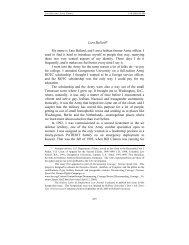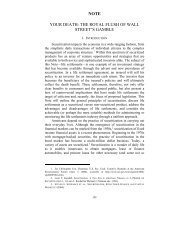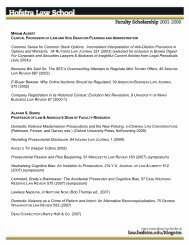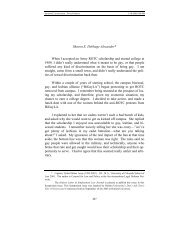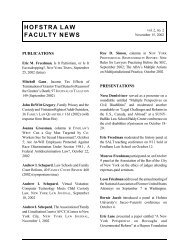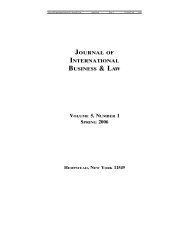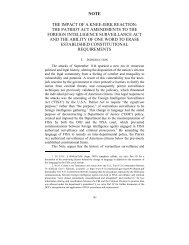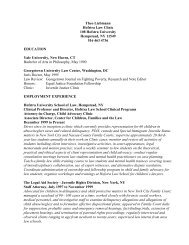JOURNAL OF INTERNATIONAL BUSINESS & LAW - Hofstra Law ...
JOURNAL OF INTERNATIONAL BUSINESS & LAW - Hofstra Law ...
JOURNAL OF INTERNATIONAL BUSINESS & LAW - Hofstra Law ...
You also want an ePaper? Increase the reach of your titles
YUMPU automatically turns print PDFs into web optimized ePapers that Google loves.
FELDMAN FORMATTED4/24/2009 5:54:31 PMTHE <strong>JOURNAL</strong> <strong>OF</strong> <strong>INTERNATIONAL</strong> <strong>BUSINESS</strong> & <strong>LAW</strong>where and what they invest their money into.C. The Need for Stronger <strong>Law</strong>s Governing Compulsory LicensesStricter and more objective laws are needed to govern the practice ofissuing compulsory licenses in order to maintain the delicate balance betweenthe right of access to life-saving medicines and the right pharmaceuticalcompanies have to earn a profit from their inventions. Of course, under verylimited circumstances, compulsory licenses can be a beneficial tool. 36However, there is a fine line dividing when the practice of issuing compulsorylicenses is proper and when it will cause disastrous results. 37There are at least four detrimental consequences that will arise if thelanguage of the TRIPS Agreement is not amended. 38 First and foremost, ifcompulsory licenses are too easily obtainable, absent the threat of an acutehealth crisis, innovation funding will erode. 39 It is the monopoly powerpharmaceutical companies are capable of obtaining over their patentedmedicines that induces invention. 40 Therefore, future investment inpharmaceuticals will be viewed as a risk without this monopoly power.Secondly, a decline in global health will result because pharmaceuticalcompanies will be hesitant to introduce new medications into nations with highrates of disease. Additionally, the nation that will manufacture the genericversion of drug after a compulsory license has been issued will generally havelower standards of quality than the country that manufactured the named branddrug. Thirdly, absent strong intellectual property protections foreign investmentwill decline, causing devastating effects on developing nations. Lastly, theAmerican economy will further suffer based on the large, job-producingpharmaceutical industry in America, which is dependent on strong intellectualproperty rights protections.The practice of issuing compulsory licenses is likely to increase in theup to $288 billion on research and development).36 See generally Holger P. Hestermeyer, Canadian-made Drugs for Rwanda: The First Applicationof the WTO Waiver on Patents and Medicine, ASIL INSIGHTS, December 10, 2007, available athttp://www.asil.org/insights071210.cfm (explaining the recent success of Rwanda importing genericHIV/AIDS drugs from Canada).37 See generally Kevin Outterson, Fair Followers: Expanding Access to Generic Pharmaceuticalsfor Low-income Populations, in THE POWER <strong>OF</strong> PILLS (Jillian Clare Cohen, Patricia Illingworth &Udo Schuklenk, eds., 2008), available at http://www.cptech.org/ip/health/prizefund/files/outtersonaccess-to-generics.pdf(explaining that overuse of compulsory licensing can be dangerous).38 Each danger will be discussed in greater detail in Section V infra.39 Cahoy, supra note 1, at 134.40 Id.142



